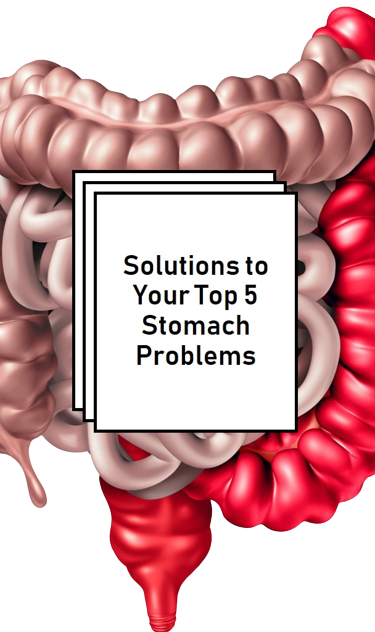When it comes to our overall well-being, a healthy stomach plays a pivotal role. However, stomach problems can disrupt our daily lives and affect our quality of life. In this comprehensive guide, we will delve into the top 5 stomach problems that people commonly face and provide effective solutions to help you regain control of your digestive health.

Combat stomach issues with knowledge and professional guidance for a happier, healthier life. Relief is within reach
1. Acid Reflux: Acid reflux, also known as gastroesophageal reflux disease (GERD), can be a painful and uncomfortable condition. It occurs when stomach acid flows back into the esophagus, causing a burning sensation in the chest. To alleviate the symptoms of acid reflux,
consider the following remedies:
a. Dietary Changes: Avoid spicy and acidic foods.
Eat smaller, more frequent meals.
Stay upright after eating.
b. Lifestyle Modifications: Elevate the head of your bed. Maintain a healthy weight. Quit smoking.
2. Irritable Bowel Syndrome (IBS)
IBS is a common digestive disorder characterized by symptoms like abdominal pain, bloating, and irregular bowel movements. Managing IBS involves a multi-faceted approach:
a. Fiber Intake: Increase soluble fiber consumption. Limit insoluble fiber intake.
b. Stress Reduction: Practice relaxation techniques. Consider cognitive-behavioral therapy.
c. Medications: Consult a healthcare provider for prescription options.
3. Constipation: Constipation is a prevalent stomach issue, causing infrequent bowel movements and discomfort. To combat constipation effectively, incorporate the following strategies:
a. Dietary Choices: Consume high-fiber foods like fruits and vegetables. Stay hydrated by drinking plenty of water. Avoid excessive dairy and processed foods.
b. Regular Exercise: Engage in physical activity to promote bowel regularity.
c. Over-the-counter remedies: Use laxatives as a short-term solution under medical guidance.
4. Gastritis: Gastritis is inflammation of the stomach lining and can lead to abdominal pain and discomfort. Here’s how you can address gastritis:
a. Diet Modification: Avoid spicy and acidic foods. Consume smaller, more frequent meals.
b. Medications: Over-the-counter antacids may help. Prescription medications might be necessary in severe cases.
c. Lifestyle Changes: Limit alcohol consumption. Quit smoking.
5. Food Intolerances: Food intolerances, such as lactose or gluten intolerance, can wreak havoc on your stomach. Identifying the specific intolerances is key:
a. Food Diary: Keep a diary of your food intake and symptoms. Look for patterns to identify potential triggers.
b. Elimination Diet: Gradually eliminate suspected trigger foods. Reintroduce them one at a time to pinpoint the culprits.
In conclusion, stomach problems can significantly impact our daily lives, but with the right knowledge and strategies, you can take control of your digestive health. Remember that consulting a healthcare professional is crucial for an accurate diagnosis and personalized treatment plan. By implementing these solutions, you can pave the way for a happier, healthier stomach and an improved overall quality of life.
